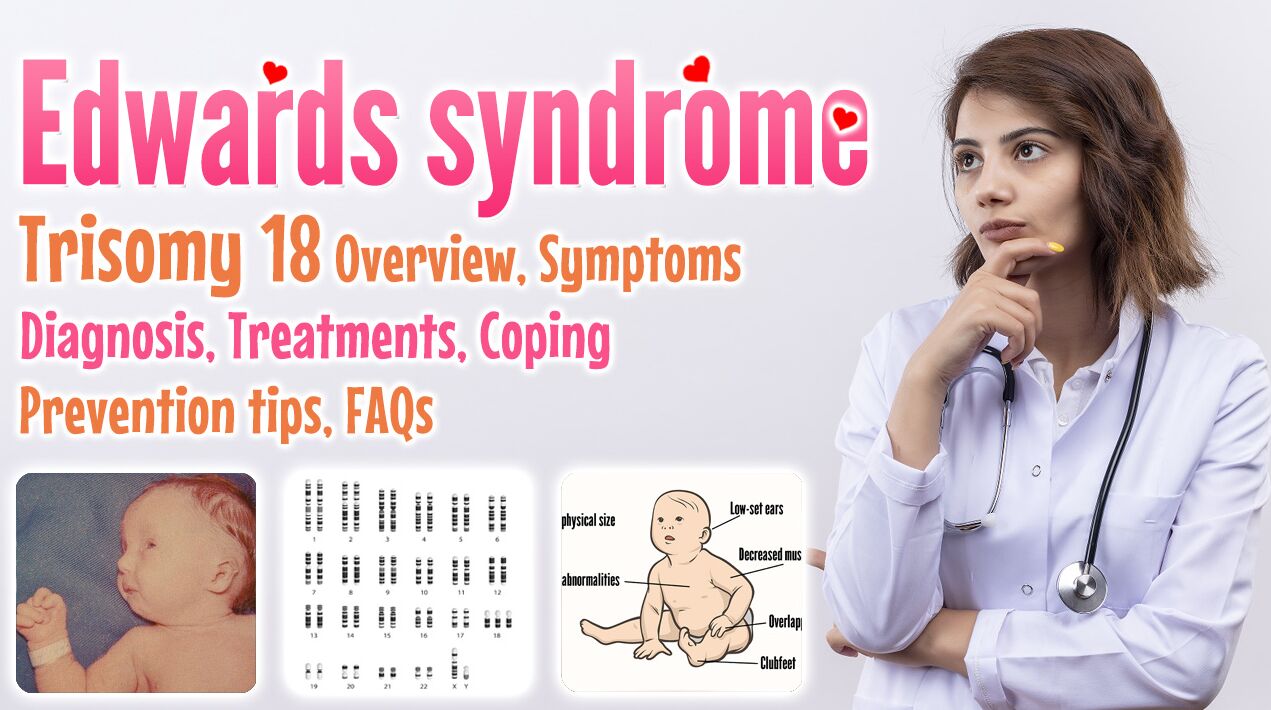
Trisomy 18, also known as Edwards syndrome, named after the British physician John Hilton Edwards, who first described the condition in 1960, is a genetic condition characterized by the presence of an extra chromosome 18 in some or all of the body’s cells. This additional genetic material disrupts normal development, leading to a range of physical and intellectual disabilities. In this article, we delve into the intricacies of trisomy 18, exploring its causes, symptoms, diagnosis, management, and the impact it has on affected individuals and their families.
In this video, we will explore the different types of trisomy, their causes, symptoms, diagnosis, treatment and prevention options, and address frequently asked questions.
By the way, welcome to our channel, don’t forget to thumb up and subscribe.
Causes of Trisomy 18
Genetic Basis
Trisomy 18 typically occurs due to an error in cell division during the early stages of fetal development. Instead of the usual pair of chromosome 18, affected individuals have three copies of this chromosome in each cell, hence the term “trisomy.” The exact cause of this chromosomal abnormality remains unclear, but it is believed to arise sporadically rather than being inherited from parents.
Maternal Age
Advanced maternal age is a significant risk factor for trisomy 18. Women over the age of 35 have a higher likelihood of conceiving a child with this condition. However, it’s essential to note that trisomy 18 can occur in pregnancies at any age.
Environmental Factors
While the majority of trisomy 18 cases are sporadic, certain environmental factors may increase the risk. Exposure to toxins, radiation, or certain medications during pregnancy could potentially contribute to the development of chromosomal abnormalities in the fetus.
Symptoms and Signs
The manifestations of trisomy 18 vary widely among affected individuals, but there are several common features that characterize the condition. These include:
Physical Manifestations
- Low birth weight
- Craniofacial abnormalities (such as a small jaw, low-set ears, and clenched fists)
- Heart defects
- Kidney malformations
- Clenched hands with overlapping fingers
- Rocker-bottom feet
Developmental Delays
Children with trisomy 18 often experience significant developmental delays, including delays in motor skills, speech, and cognitive abilities. Many affected individuals have intellectual disabilities and require ongoing support and intervention throughout their lives.
Cardiac Abnormalities
Heart defects are prevalent in individuals with trisomy 18 and are a leading cause of morbidity and mortality. These abnormalities can range from structural defects, such as ventricular septal defects and atrial septal defects, to more complex cardiac anomalies requiring surgical intervention.
Diagnosis and Prenatal Screening
Detecting trisomy 18 early in pregnancy can be challenging, but advances in prenatal screening and diagnostic testing have improved detection rates.
Ultrasound Examination
During routine prenatal ultrasounds, certain markers may indicate a higher risk of chromosomal abnormalities, including trisomy 18. These markers include an abnormal skull shape, heart defects, and intrauterine growth restriction.
Genetic Testing
Confirmatory testing, such as amniocentesis or chorionic villus sampling (CVS), can provide a definitive diagnosis of trisomy 18 by analyzing fetal chromosomes obtained from amniotic fluid or placental tissue. These tests carry a small risk of miscarriage and are typically offered to women with abnormal ultrasound findings or other risk factors.
Screening Options for High-Risk Pregnancies
For women at increased risk of having a child with trisomy 18, non-invasive prenatal screening tests, such as cell-free DNA testing, offer a safer alternative to invasive diagnostic procedures. These tests analyze fetal DNA circulating in the maternal bloodstream and can accurately assess the risk of chromosomal abnormalities.
Treatment and Management idea for trisomy 18
While there is no cure for trisomy 18, supportive care and early intervention can improve the quality of life for affected individuals and their families.
Trisomy 18 presents significant challenges for affected individuals and their families, requiring comprehensive medical care, emotional support, and advocacy efforts. Despite the obstacles, advances in medical technology and research offer hope for improved outcomes and better quality of life for individuals living with this condition.
Prognosis of trisomy 18
Trisomy 18, has a poor prognosis with many affected fetuses not surviving to birth and most live-born infants dying within their first year. Survivors often face severe developmental delays, intellectual disabilities, and physical abnormalities such as congenital heart defects. They are also prone to medical complications like feeding difficulties and respiratory problems, requiring intensive medical care. While some individuals, particularly those with milder forms, may live longer, overall survival rates are low.
Frequently asked questions (FAQs) about Trisomy 18
1. Is trisomy 18 hereditary?
Trisomy 18 typically occurs sporadically and is not inherited from parents. However, there is a small risk of recurrence in families with a history of chromosomal abnormalities.
2. What is the life expectancy of individuals with trisomy 18?
The majority of infants born with trisomy 18 do not survive beyond the first year of life. However, with advances in medical care and supportive interventions, some individuals may live into childhood or adolescence.
3. Can trisomy 18 be detected before birth?
Yes, prenatal screening and diagnostic tests, such as ultrasound examination and genetic testing, can detect trisomy 18 during pregnancy.
4. What are the treatment options for trisomy 18?
While there is no cure for trisomy 18, treatment focuses on managing symptoms and providing supportive care to improve quality of life.
5. How can families cope with the challenges of trisomy 18?
Coping with the challenges of trisomy 18 requires a strong support network, access to medical and therapeutic services, and open communication with healthcare providers.
-
What are the main differences in prognosis between trisomy 18, 13, and 21?
Trisomy 18, Trisomy 13 (Patau Syndrome), and Trisomy 21 (Down Syndrome) all are genetic disorders caused by an extra chromosome. Trisomy 18 and 13 lead to severe health issues and high infant mortality, with most not surviving past the first year. Trisomy 21 causes intellectual disabilities but has a better prognosis, with many individuals living into adulthood. Each condition affects a different chromosome: 18, 13, and 21, respectively.